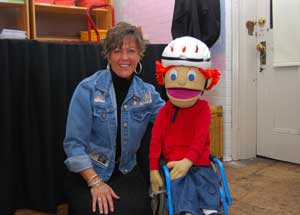Editorial
Front Page - Friday, January 1, 2010
Kids on the Block helps children understand unique differences
Stephanie Coward

Chattanooga Kids on the Block uses life-like puppets to educate children on difficult issues. The troupe provides a platform, which encourages children to ask questions to puppets that are both lifelike and relatable to the age group on hand.
Founded in 1979 by Mary Ann Schenk, the Chattanooga troupe is one of the oldest in the U.S., according to Executive Director Kelly Williams. “We started two years after the national program,” she said.
The parent organization – Kids on the Block Inc. – is a for-profit international organization. “They do all the research; they script and field test all of the performances and they provide the puppets,” Williams said.
Every KOTB troupe is independent and non-profit. “They can either be stand alone like we are, or they can be through other programs,” Williams said. “We purchase the scripts, through Kids on the Block (Inc.), and the puppets. And then most of the accessories, whether it be glasses for the puppets or one of our puppets, Rinaldo, is blind so he uses a cane, so we purchase those, and the wheelchair that Mark Riley uses.”
Becoming a puppeteer is at least a three-month process. “All of our puppeteers are national Bunraku certified artists. They train about three months in Bunraku puppetry and then they maintain about a minimum of 10 hours a month in in-service training,” Williams said. “There are some months they do 20 and 30 hours of in-service training on specific topics like child abuse prevention, asthma awareness or epilepsy, and we try to go to support groups of the programs that we have so that we’re aware of actual questions and actual illnesses or topics that people are experiencing.”
The puppeteers dress all in black complete with a hood. “We do explain that to the children before because that can be a little creepy,” Williams said.
Williams said the troupe currently performs over 17 programs but they are licensed to perform 24 programs and there are a total of 41 offered through the national program. “We will always try to work with any organization, community or any school to make sure the children receive information that they need,” Williams said.
The troupe also provides follow-up materials to the children the perform for. The follow-up materials include parent information, information for teachers, classroom activities and other materials.
“The uniqueness of our programs are that, not only do we perform the program and the puppets literally talk to the children then after the program’s finished, there’s an interaction with the children,” Williams said. “So the children actually get to talk to the puppets, ask them questions about what they just saw and the puppets respond to them and that’s why our puppeteers have to be well versed, have to know what they’re talking about, so they can answer children’s questions.”
The troupe is also a licensed child abuse prevention agency. “We do child sexual abuse and physical abuse for third grade students and anybody else when they ask,” Williams said. And that’s difficult, … even as a parent, it’s hard to talk to your children about sexual abuse and physical abuse and what’s right and what’s wrong so that they will understand it.”
Williams said that parents are always invited to the performances, “All they have to do is call.”
Mark Riley has cerebral palsy and he calls it CP and he calls his wheelchair his “cruiser.” “He goes to school. He’s a normal 11-year-old boy and he wears the helmet, which is always a question,” Williams said. “He still has his own bed and he can get in and out of it and he still has his own bathroom. It has to be a little bit bigger. That’s another big question about the bathrooms.” During a cerebral palsy performance, children will learn that Mark can even go camping and play T-ball and wheelchair basketball, just like all of them.
“He swims; that’s a little more difficult for him because he does need help but he can swim. He’s just a normal child with a cruiser,” Williams said.
The troupe spends all summer training and then by about mid-September through May their days are spent traveling to various districts and working with the children. The troupe serves over 12 Tennessee counties and parts of Georgia.
“Our puppeteers are amazing and we hold training for other puppet troupes in the United States every August,” Williams said.
Currently there are three full-time puppeteers and one part timer. “We would like to have at least one of two more full time puppeteers,” Williams said. “Last year we performed 489 programs and saw over 53,000 children.”
More can be learned about KOTB by visiting http://www.kidsontheblock.
net
|
|